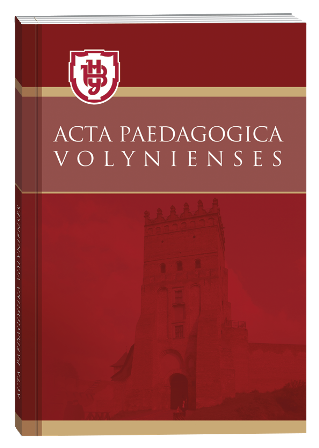STUDENT SELF-GOVERNMENT IN HIGH SCHOOL AS AN IMPORTANT FACTOR IN THE FORMATION OF THE FUTURE PEDAGOGY
DOI:
https://doi.org/10.32782/apv/2023.2.3Keywords:
student self-government, higher education, personally oriented and competency-based approaches, professional and personal growthAbstract
The article examines the problem of student self-government and its role in improving the professional training of future teachers. Based on the analysis of the scientific fund, the approaches to the organization of the educational process of the higher education institution are summarized. Anthropological, creative, subject-objective, humanistic, complex, all-human, holistic and activity approaches are highlighted as dominant. Emphasis is placed on the interrelationship and interdependence of the individual approaches. The goal of scientific research is to theoretically generalize the essence of student self-government and its place in the system of educational work in a higher education institution. The article highlights the functional purpose of student self-government, which boils down to maximum expression and implementation of initiative, students’ creative abilities, and their moral qualities when involved in management activities. Active participation of students in various structures of self-government is an important factor in the selfrealization of an individual, development of his stable civic position. It was noted that the active participation of education seekers in the work of self-governing bodies enables changes in the consciousness of a person in the most complete identification of the highest need for personal and professional development, ensures the acquisition of relevant knowledge – basic and professional. The opinion that student selfgovernment is an integral component of the teacher’s professional training system is generalized. An important key to the success of student self-government activities is the organization of personally oriented training of applicants based on an activity approach, ensuring effective and sustainable pedagogical interaction of the subjects of the educational process, the introduction of psychological-pedagogical and managerial educational components, interactive learning technologies.
References
Кому у ВУЗі належить роль першої скрипки? ... : доповідь директора Інституту вищої освіти АПН України В. П. Андрущенка : «Теоретико-методологічні засади реформування вищої освіти в Україні» на загальних зборах АПН України // Освіта. 2000. 6–13 груд. (№ 57–58). С. 2.
Наказ Міністерства освіти і науки України від 15 листопада 2007 р. № 1010 «Про затвердження Примірного положення про студентське самоврядування у вищих навчальних закладах України». [Електронний ресурс]. – Режим доступу: https://zakon.rada.gov.ua/rada/show/v1010290–07#Text
Підготовка майбутнього вчителя до впровадження педагогічних технологій / О. М. Пєхота, В. Д. Будак, А. М. Старева. К. : А.С.К., 2003. 240 с.
Психологічні аспекти гуманізації освіти: книга для вчителя / за ред. Г. О. Балла. Київ-Рівне, 1996. 128 с.
Робуль О. М., Семергей О. В. Сучасні підходи до виховання студентської молоді. Виховна робота у вищих навчальних закладах: симбіоз нового і традиційного. Збірник наукових праць за матеріалами Всеукраїнської науково-практичної конференції (27–28 листопада 2000 року). Кам’янець-Подільський, 2001. С. 110.
Скрипка О. В. Деякі аспекти формування особистості студента. Виховна робота у вищих навчальних закладах: симбіоз нового і традиційного. Кам’янець-Подільський: Кам’янець-Подільський державний педагогічний університет, 2001. С.104–107. (Про виховні засади освітнього процесу сучасного вищого навчального закладу).







